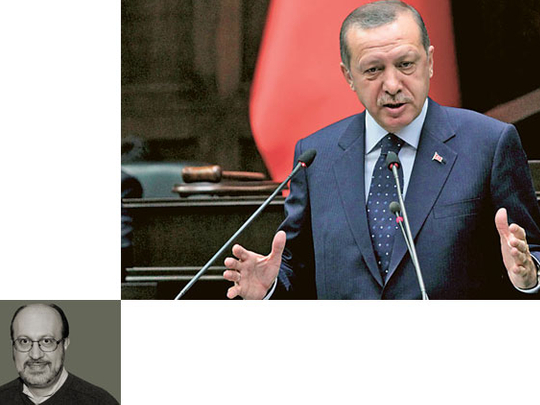
Once foes before burying the war hatchet, Turkey and Syria are, once again, antagonistic. With over 100,000 Syrians in Turkish refugee camps, regular military attacks on both sides, and unending diplomatic salvos among challenged leaders, one simply wonders whether outright confrontation may be avoided between Ankara and Damascus.
Although reluctant to move without a UN mandate, or at least a clear Nato authorisation, Turkey may be tempted to engage its armed forces, for two unrelated reasons: to restore the tarnished reputation of the Turkish Armed Forces and, equally important to finally implement the AKP’s (Justice and Development Party) pan-Islamist ideological vision that gave Turkishness some gravitas.
Ironically, the latter stood in direct contradiction of secular Kemalism that defined Turkey between 1923 and 1982, which was revealing to say the least. Under the AKP, Turkishness was not meant to be an empty shell, which was why it needed an Islamic identity. Indeed, it may be accurate to state that Turkish society embarked on Neo-Ottomanism precisely to empower such a vision both at the political as well as cultural levels.
Ironically, and in the aftermath of the 1979 Islamic Revolution in Iran that awakened a Shiite revival, Turkish leaders perceived the need to rekindle the defunct Ottoman Empire to lead the Sunni world. Of course, this goal was not particularly popular in the Arab world, though fear of Iranian hegemony overlooked Turkish ambitions.
Still, because Tehran championed core Arab causes by backing Hamas and Hezbollah, Ankara astutely sold its prowess by marketing its anti-western credentials, starting with the fall of Constantinople in 1453 all the way to the Ottoman victory at Gallipoli in 1915. Remarkably, Turkish textbooks identified Ataturk, the republic’s founder, as an ‘Ottoman officer’, which certainly linked the past with the present.
For the balance of the 1980s and 1990s, Ankara ingratiated itself with fellow Sunni regimes throughout the Arab world and actually improved ties with Iraq, Syria and Lebanon. It also went beyond its immediate periphery, by forging close relations with Arab Gulf states, as well as most Muslim nation-states. It was a grand bargain that meshed Turkish identity with Islam.
In fact, the 700th anniversary of the creation of the Ottoman Empire in 1999, presented Ankara with a golden opportunity to settle on a global agenda that aggrandised its outlook, positioning itself as the sole natural Sunni leader to balance Tehran. Even if few Turks actually believed that they could revive the Ottoman Empire, the opening was too attractive to let go.
Consequently, social scientists produced the 12 volume, Encyclopedia of the Ottoman Empire, while artists flooded the market with movies and television programmes — all of which were duly translated into Arabic and other languages — to further expand Turkish political horizons.
What tipped the balance of this search, nevertheless, was the appointment of a new minister of foreign affairs in 2009, Ahmet Davutoglu, whose 2001 opus, Strategic Depth, emphasised Turkey’s Ottoman heritage. Davutoglu acolytes compared him to Henry Kissinger and his Neo-Ottomanist views received ample attention. In a moment of utter self-assurance in 2010, the affable minister told the Washington Post that if “the Ottoman Empire ruled over [what are today] 45 different sovereign states, then why shouldn’t these states unite under the Ottoman Commonwealth just like the British Commonwealth?” “Naturally,” confided Davutoglu, “Turkey is the legitimate successor state of this empire,” which implied that Ankara was ready to lead the charge.
Hubris side — since Turkey had not even bothered to canvass Arab and Muslim opinion to gauge whether such a goal was endorsed — Ankara found in Recep Tayyib Erdogan precisely the official who could, presumably, unite the military at home and lead the entire Sunni world. Erdogan saw himself as a new Sultan, promoting unity around the faith at home, and marketing himself as the genuine item to fellow Muslims, especially Arabs.
This is where the Syria debacle comes into play for Ankara now faces an existential dilemma: how to reconcile its quest for global leadership with its commitment to western powers? By merely issuing warning after warning to Damascus to stop butchering its own people, and effectively watching the misery in the neighbouring country spilling over inside Turkey — mainly over the super sensitive Kurdish issue — Turkey telegraphed anxiety rather than leadership.
Sultan Sulaiman the Magnificent, the lawmaker that defined Ottoman Islam and who was the character Erdogan wished to imitate, seldom hesitated to engage his foes. Ebrahim Pasha, the Grand Vizier whose ruthlessness was legendary and who was “more royalist than the king,” rarely vacillated, something that could not be said of Davutoglu.
In the event, the ongoing Syrian civil war threatened to undo the Turkish revival of its Ottoman vision, simply because Ankara over calculated how it could best serve Turkish interests versus those of the Muslim world. This, in part, explained the Iranian savvy—that its ideological message was geared to advance pan-Islamic values rather than protect and serve Shi‘ah or Persian ambitions. Unlike Iran, however, Turkey was well positioned to alter the end-game, though that move required the kind of confidence that was not currently available in Ankara.
Dr Joseph A. Kéchichian is the author of the forthcoming Legal and Political Reforms in Saudi Arabia.








